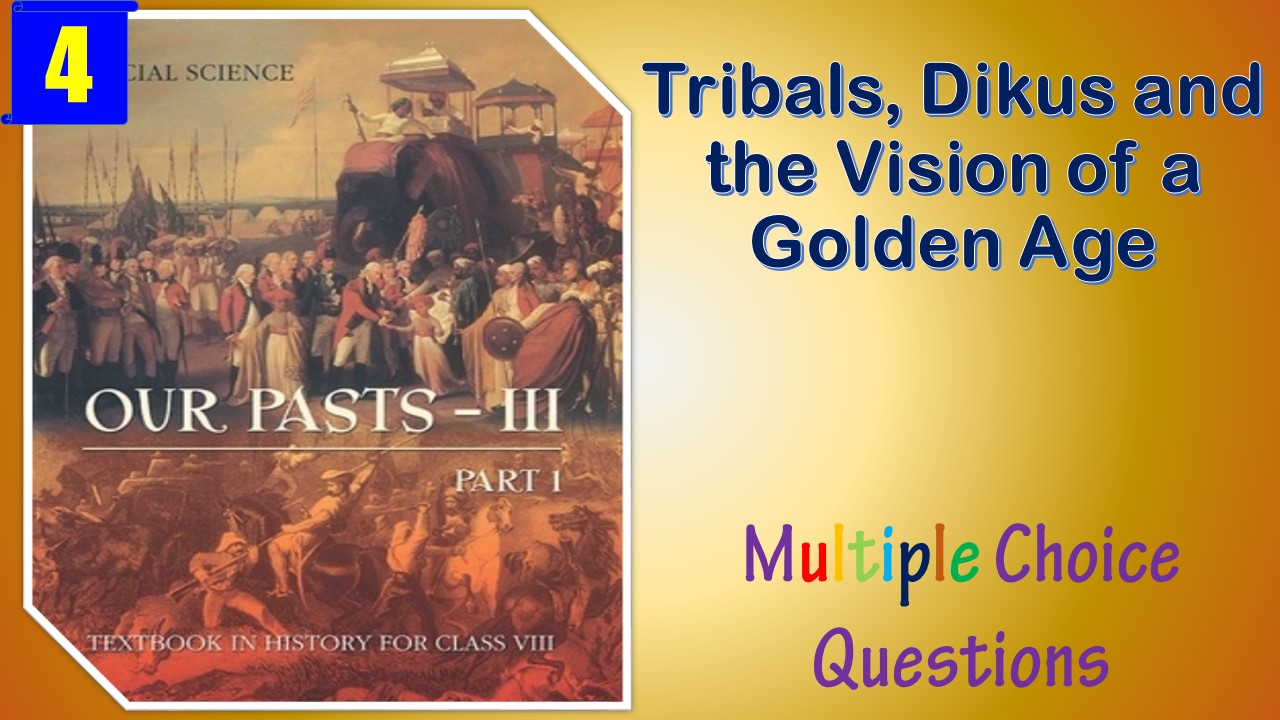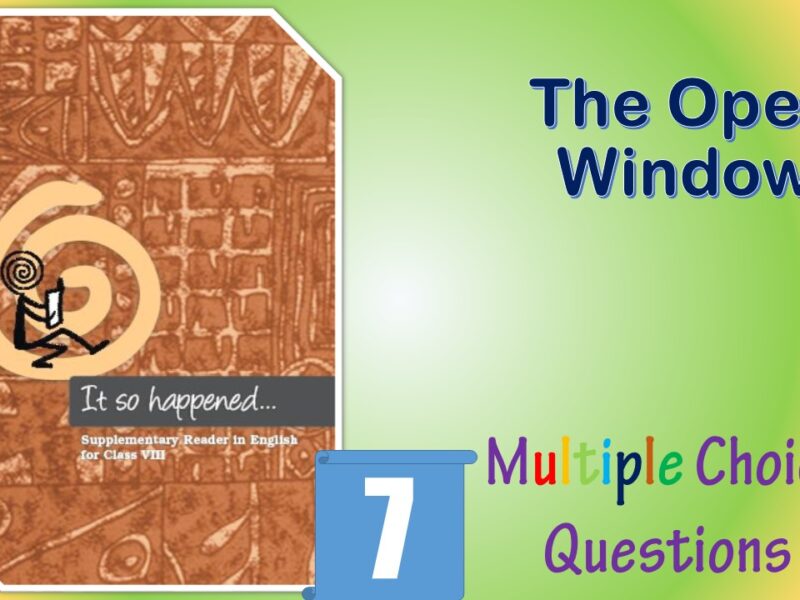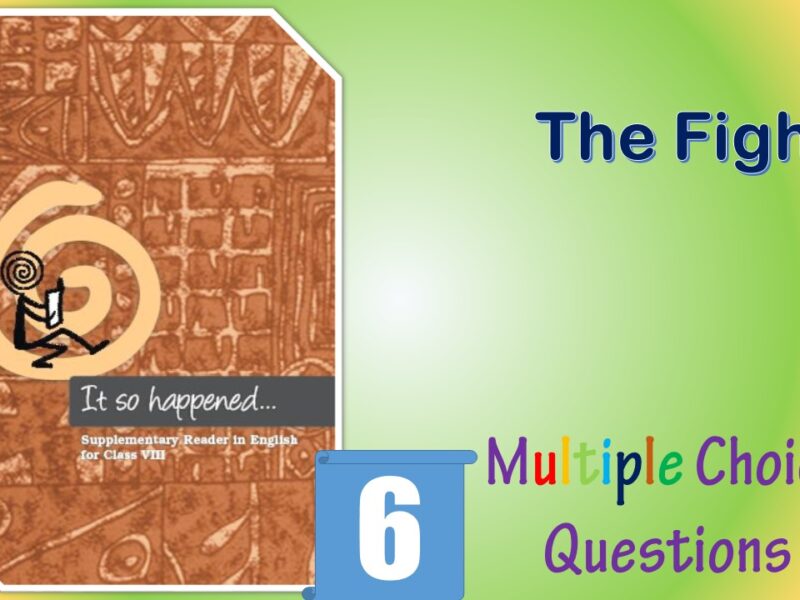Class 8 Social Science History MCQ Tribals, Dikus and the Vision of a Golden Age with Answers is Prepared Based on Latest Exam Pattern. Students can solve NCERT Class 8 Social Science History MCQ Tribals, Dikus and the Vision of a Golden Age with Answers to know their preparation level.
Students who are searching for NCERT Class 8 Social Science History MCQ Tribals, Dikus and the Vision of a Golden Age with Answers are compiled here to get good practice on all fundamentals. Know your preparation level on MCQ Questions for Class 8 Social Science History MCQ Tribals, Dikus and the Vision of a Golden Age with Answers. You can also verify your answers from the provided Class 8 Social Science History MCQ Tribals, Dikus and the Vision of a Golden Age with Answers. So, ace up your preparation with MCQ of Class 8 Social Science History MCQ & NCERT Textbook solutions Examinations.
CBSE Class 8 Social Science History MCQ
Tribals, Dikus and the Vision of a Golden Age
with Answers
Question :The local weavers and leather workers turned to ………………… for supplies of Kusum and Palash flowers.
(a) Santhals
(b) Mundas
(c) Khonds
(d) Labadis
Answer : (c) KhondsShow Answer :
Question :The Bastar Rebellion in Central India broke out in
(a) 1900
(b) 1910
(c) 1920
(d) 1940
Answer : (b) 1910Show Answer :
Question :Which revolt was popular in Maharashtra in 1940?
(a) The Kols
(b) The Bastar
(c) The Warli
(d) Birsa movement
Answer : (c) The WarliShow Answer :
Question :The Khonds lived in
(a) Karnataka
(b) Madhya Pradesh
(c) Bihar
(d) Odisha
Answer : (d) OdishaShow Answer :
Question :What type of lives did the herders live?
(a) Sophisticated
(b) Settled
(c) Nomadic
(d) None of these
Answer : (c) NomadicShow Answer :
Question :____________________. tribe practised settled agriculture.
(a) Khonds
(b) Santhals
(c) Labadis of Andhra Pradesh
(d) Mundas of Chottanagpur Plateau
Answer : (d) Mundas of Chottanagpur PlateauShow Answer :
Question :Jhum cultivation is practised these days in
(a) eastern states of India
(b) western states of India
(c) northern states of India
(d) southern states of India
Answer : (a) eastern states of IndiaShow Answer :
Question :Santhals tribe rose in revolt in the year
(a) 1900
(b) 1855
(c) 1920
(d) 1930
Answer : (b) 1855Show Answer :
Question :In many regions Forest Department set up forest villages to ensure
(a) a regular supply of cheap labour
(b) a regular supply of forest produce
(c) a regular supply of agricultural produce
(d) none of the above
Answer : (a) a regular supply of cheap labourShow Answer :
Question :The revolt of Songram Sangma rose in the year 1906 in
(a) Bengal
(b) Madhya Pradesh
(c) Assam
(d) Odisha
Answer : (c) AssamShow Answer :
Question :The forest Satyagraha rose in the central provinces in
(a) 1910
(b) 1920
(c) 1930
(d) 1940
Answer : (c) 1930Show Answer :
Question :Birsa spent time in the company of ____________________. preachers.
(a) Buddha
(b) Vaishnav
(c) Sikhs
(d) None of these
Answer : (b) VaishnavShow Answer :
Question : The tribals who reared goats and from Kashmir:
(a) Gaddis
(b) Van Gujjars
(c) Baigas
(d) Bakarwals
Answer :(d) BakarwalsShow Answer :
Question :Why did the British consider the Chhota Nagpur belt vital?
(a) This region had rich minerals and also dense teak and sal forests
(b) This region was an important place for the British to sell their produce .
(c) This region had a lot of adivasis who could work for the British
(d) This region had many big buildings
Answer :(a) This region had rich minerals and also dense teak and sal forestsShow Answer :
Question :The Bastar Rebellion in Central India broke out in
(a) 1900
(b) 1910
(c) 1920
(d) 1940
Answer :(b) 1910Show Answer :
Question :The Santhal tribals belong to-
(a) Uttar Pradesh
(b) Madhya Pradesh
(c) Jharkhand
(d) Maharashtra
Answer :(c) JharkhandShow Answer :
Question :Britishers were referred as _ by tribals.
(a) killers
(b) devta
(c) Dikus
(d) Raja
Answer :(c) DikusShow Answer :
Question :The man seen roaming the forests and villages of Chottanagpur in Jharkhand in 1895 was:
(a) Birsa
(b) Dikus
(c) Santhal
(d) Chiefs
Answer :(a) BirsaShow Answer :
Question :What does the word dikus refer to in the Chhota Nagpur region?
(a) Natives
(b) Outsiders
(c) Citizens
(d) Communities
Answer :(b) OutsidersShow Answer :
Question :The Khonds lived in
(a) Karnataka
(b) Madhya Pradesh
(c) Bihar
(d) Odisha
Answer :(d) OdishaShow Answer :
Question :During which period the live of tribal groups mostly changed?
(a) Mughals
(b) Sultanate
(c) After Independence
(d) British period
Answer :(d) British periodShow Answer :
Question :To colour their clothes, tribals use the flowers of
(a) mango
(b) kusum
(c) lotus
(d) rose
Answer :(b) kusumShow Answer :
Question :The cultivators who practised shifting cultivation were:
(a) Khonds
(b) Khanda
(c) Jhum
(d) Mundas
Answer :(c) JhumShow Answer :
Question :According to the list given below, who were the Van Gujjars of the Punjab hills?
(a) Reared only goats
(b) Cattle herders
(c) Village heads
(d) Money lenders
Answer :(b) Cattle herdersShow Answer :
Question :Jhum cultivation is practised these days in
(a) eastern states of India
(b) western states of India
(c) northern states of India
(d) southern states of India
Answer :(a) eastern states of IndiaShow Answer :
Question :Who were Khonds?
(a) Hunters
(b) Settled
(c) Food gatherers
(d) Jhum cultivators
Answer :(a) HuntersShow Answer :
Question :Oran tribe is based in
(a) Kerala
(b) Jharkhand
(c) Tamilnadu
(d) Punjab
Answer :(b) JharkhandShow Answer :
Question :Who was Baigas from central India?
(a) Were reluctant to work for others
(b) Considered themselves as the people of the forest
(c) Was below their dignity to work as labor
(d) All of them
Answer :(d) All of themShow Answer :
Question :From the seeds of Sal and Mahua, the tribal extract oil to cook. What exactly is Mahua ?
(a) Root of a tree
(b) A flower that is eaten or used to make alcohol
(c) Stem of a tree
(d) Leaves of a tree
Answer :(b) A flower that is eaten or used to make alcoholShow Answer :
Question :In many regions Forest Department set up forest villages to ensure
(a) a regular supply of cheap labour
(b) a regular supply of forest produce
(c) a regular supply of agricultural produce
(d) none of the above
Answer :(a) a regular supply of cheap labourShow Answer :
Question :Warli revolt took place in-
(a) Rajasthan
(b) Gujarat
(c) Maharashtra
(d) Tamilnadu
Answer :(c) MaharashtraShow Answer :
Question :__ is one of the animals reared by tribals
(a) Yak
(b) Dog
(c) cat
(d) snake
Answer :(a) YakShow Answer :
Question :Bewar is used for which purpose in Madhya Pradesh?
(a) Shepherds
(b) Cattle herders
(c) Shifting cultivation
(d) Traders and money lenders
Answer :(c) Shifting cultivationShow Answer :
Question :Apart from the Forest Regulation Act, which was the other Act passed by the British in 1871 which labeled all the adivasi groups that rebelled against the British as criminals.
(a) Illegal Tribes Act
(b) Illegal societies Act
(c) Criminal Societies Act
(d) Criminal Tribes Act
Answer :(d) Criminal Tribes ActShow Answer :
Question :Birsa spent time in the company of …..preachers.
(a) Buddha
(b) Vaishnav
(c) Sikhs
(d) None of these
Answer :(b) VaishnavShow Answer :
Question :Which tribe was reluctant to work for others?
(a) Khond
(b) Munda
(c) Baiga
(d) Kol
Answer :(c) BaigaShow Answer :
Question :British failed in their efforts to settle _ at one place.
(a) tribals
(b) Jhum cultivators
(c) villagers
(d) farmers
Answer :(b) Jhum cultivatorsShow Answer :
Question :Name the four geographic regions where adivasis predominantly live?
(a) North-eastern states
(b) Central India
(c) South India
(d) All of these
Answer :(d) All of theseShow Answer :
Question : Tribals who saw themselves as people of forest and could only live on the produce of forest:
(a) Baigas
(b) Van Gujjars
(c) Khonds
(d) Palash
Answer : (a) BaigasShow Answer :
Question :The tribals who reared goats and from Kashmir:
(a) Gaddis
(b) Van Gujjars
(c) Baigas
(d) Bakarwals
Answer : (d) BakarwalsShow Answer :
Question :The Khonds community used Sal and Mahua seeds for:
(a) Prepare hair oil
(b) Making garlands
(c) Obtaining food
(d) For preparing food
Answer : (d) For preparing foodShow Answer :
Question :The man seen roaming the forests and villages of Chottanagpur in Jharkhand in 1895 was:
(a) Birsa
(b) Dikus
(c) Santhal
(d) Chiefs
Answer : (a) BirsaShow Answer :
Question :Outsiders were being referred to as:
(a) Gonds
(b) Krishra
(c) Palash
(d) Dikus
Answer : (d) DikusShow Answer :
Question :The cultivators who practised shifting cultivation were:
(a) Khonds
(b) Khanda
(c) Jhum
(d) Mundas
Answer : (c) JhumShow Answer :
Question :For what purpose Kusum and Palash flowers are used?
(a) Extracting oil from the seeds
(b) Coloring clothes and leather
(c) Cooking and making food
(d) All of them
Answer : (b) Coloring clothes and leatherShow Answer :
The local weavers and leather workers turned to the Khonds when they needed supplies of kusum and palash flowers to colour their clothes and leather.
Question :Who was Baigas from central India?
a) Were reluctant to work for others
b) Considered themselves as the people of the forest
c) Was below their dignity to work as labor
(d) All of them
Answer : (d) All of themShow Answer :
The Baigas of central India were reluctant to do work for others. The Baigas saw themselves as people of the forest, who could only live on the produce of the forest.
Question :What were the Santhals of Hazaribagh?
(a) Cultivated small patches of land
(b) Reared silkworm
(c) Herders of village
(d) None of these
Answer : (b) Reared silkwormShow Answer :
Hazaribagh, in present-day Jharkhand, was an area where the Santhals reared cocoons. The traders dealing in silk sent in their agents who gave loans to the tribal people and collected the cocoons.
Question :Most tribal like Khonds of Orissa?
(a) Practiced shifting cultivation
(b) Practiced subsistence farming
(c) Collected and sold forest products
(d) All of these
Answer : (c) Collected and sold forest productsShow Answer :
The Khonds were such a community living in the forests of Orissa. They regularly went out on collective hunts and then divided the meat amongst themselves.
Question :Bewar is used for which purpose in Madhya Pradesh?
(a) Shepherds
(b) Cattle herders
(c) Shifting cultivation
(d) Traders and money lenders
Answer : (c) Shifting cultivationShow Answer :
Bewar is a term used in Madhya Pradesh for shifting cultivation. In Magh, shifts were made to new bewars and hunting-gathering was the main subsistence activity.
Question :What do you mean by the term Mahua?
(a) Animal
(b) Plant
(c) Flower
(d) None of these
Answer : (c) FlowerShow Answer :
Mahua is a flower that is eaten or used to make alcohol.
Question :Name the four geographic regions where adivasis predominantly live?
(a) North-eastern states
(b) Central India
(c) South India
(d) All of these
Answer : (d) All of theseShow Answer :
The adivasis predominantly live in foot hills of Himalayan, North-eastern states, Central India and the South India.
Question :Who was the leader of Ullgulan movement?
(a) Mahatma gandhi
(b) Subhash Chandra bose
(c) Birsa Munda
(d) All of these
Answer : (c) Birsa MundaShow Answer :
Ullgulan movement was led by Birsa Munda.
Question :What do you mean by the term fallow Land?
(a) Cultivated land
(b) Field left uncultivated
(c) Land for sale
(d) None of these
Answer : (b) Field left uncultivatedShow Answer :
Fallow Land is a field (A piece of land) left uncultivated for a while so that the soil can recover.
Question :Who were Tribals?
(a) Original inhabitants of vast forests
(b) Original inhabitants of kingdom
(c) Original inhabitants of British empire
(d) None of these
Answer : (a) Original inhabitants of vast forestsShow Answer :
Tribals known as adivasis or aboriginals were the original inhabitants of vast forests in western, central, southern, eastern and north-eastern parts of the country.
(a) Chowkidar
(B) Thikanedar
(C) Outsiders
(D) None
Answer : CShow Answer :
Question : The Santhal tribals belong to-
(a) Uttar Pradesh
(B) Madhya Pradesh
(C) Jharkhand
(D) Maharashtra
Answer : CShow Answer :
Question : Type of cultivation in which farmer left the land after two or three years of cultivation-
(a) shifting agriculture
(B) primitive agriculture
(C) commercial agriculture
(D) none of the above
Answer : AShow Answer :
Question : During which period the live of tribal groups mostly changed?
(a) Mughals
(B) Sultanate
(C) After Independence
(D) British period
Answer : DShow Answer :
Question : Who were the followers of Birsa other than Mundra tribe?
(a) Khasi and Toda
(B) Santhal and Oraons
(C) Baiga and Khond
(D) Santhal and Khond
Answer : BShow Answer :
Question : Who were Khonds?
(a) Hunters
(B) Settled
(C) Food gatherers
(D) Jhum cultivators
Answer : AShow Answer :
Question : Which tribe reared cocoons?
(a) Kol
(B) Baiga
(C) Khond
(D) Santhals
Answer : DShow Answer :
Question : Warli revolt took place in-
(a) Rajasthan
(B) Gujarat
(C) Maharashtra
(D) Tamilnadu
Answer : CShow Answer :
Question : Santhal revolt took place in-
(a) 1850
(B) 1855
(C) 1852
(D) 1890
Answer : BShow Answer :
Question : In 1910 which tribe revolted in Central India?
(a) Bastar
(B) Gond
(C) Khond
(D) Munda
Answer : AShow Answer :
Question : Which tribe was reluctant to work for others?
(a) Khond
(B) Munda
(C) Baiga
(D) Kol
Answer : CShow Answer :
Question : Van Gujjars and Labadis were.
(a) Cattle herders
(B) Settled cultivators
(C) Hunters
(D) Food gatherers
Answer : AShow Answer :
Question : The Santhal tribals belong to-
(a) Jharkhand
(B) Uttar Pradesh
(C) Madhya Pradesh
(D) Maharashtra
Answer : AShow Answer :
Question : Type of cultivation in which farmer left the land after two or three years of cultivation
(a) shifting agriculture
(B) primitive agriculture
(C) commercial agriculture
(D) none of the above
Answer : AShow Answer :
Question : During which period the live of tribal groups mostly changed?
(a) Sultanate
(B) After Independence
(C)British period
(D) Mughals
Answer : CShow Answer :
Question : Who were the followers of Birsa other than Mundra tribe?
(a) Santhal and Oraons
(B) Baiga and Khond
(C) Santhal and Khond
(D) Khasi and Toda
Answer : AShow Answer :
Question : Who were Khonds?
(a) Jhum cultivators
(B) Food gatherers
(C) Settled
(D)Hunters
Answer : DShow Answer :
Question : Which tribe reared cocoons?
(a) Kol
(B) Baiga
(C)Santhals
(D) Khond
Answer : CShow Answer :
Question : Warli revolt took place in
(a) Maharashtra
(B) Rajasthan
(C) Gujarat
(D) Tamilnadu
Answer : AShow Answer :
Question : Santhal revolt took place in
(a) 1855
(B) 1890
(C) 1850
(D) 1852
Answer : AShow Answer :
Question : In 1910 which tribe revolted in Central India?
(a) Khond
(B)Bastar
(C) Gond
(D) Munda
Answer : BShow Answer :
Question : For whom the term ‘diku’ was used?
(a) None
(B) Chowkidar
(C) Thikanedar
(D)Outsiders
Answer : DShow Answer :
Question : Which tribe was reluctant to work for others?
(a) Baiga
(B) Khond
(C) Munda
(D) Kol
Answer : AShow Answer :
Question : Van Gujjars and Labadis were.
(a) Cattle herders
(B) Hunters
(C) Settled cultivators
(D) Food gatherers
Answer : AShow Answer :
Fill in the blanks
Question : Birsa wanted to set up a ____________________
Answer : Munda RajShow Answer :
Question :The British made effort to settle ____________________ cultivators.
Answer : JhumShow Answer :
Question :All members of the ____________________ were regarded as descendants of the original settler.
Answer : ClanShow Answer :
Question :____________________ were bought from the Santhals and sold by the traders at five times the purchase price.
Answer : CocoonsShow Answer :
Question : Birsa urged his followers to recover their ____________________ .
Answer : glorious pastShow Answer :
Question :Tribals were recruited to work for tea plantations of Assam and coal mines of ____________________ .
Answer : JharkhandShow Answer :
Question :____________________ in present day Jharkhand was an area where the Santhals reared cocoons.
Answer : HazaribaghShow Answer :
Question :Revolt of Sangram Sangma too place in ____________________ in Assam.
Answer : 1906Show Answer :
Question :The Gaddis of ____________________ were Shepherds.
Answer : KuluShow Answer :



